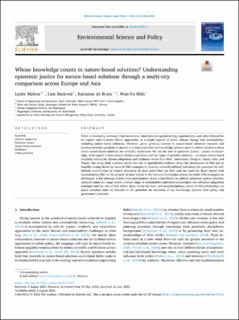| dc.contributor.author | Mabon, Leslie | |
| dc.contributor.author | Barkved, Line Johanne | |
| dc.contributor.author | de Bruin, Karianne | |
| dc.contributor.author | Shih, Wan-Yu | |
| dc.date.accessioned | 2023-03-20T15:01:16Z | |
| dc.date.available | 2023-03-20T15:01:16Z | |
| dc.date.created | 2023-01-11T16:22:58Z | |
| dc.date.issued | 2022 | |
| dc.identifier.citation | Environmental Science and Policy. 2022, 136, 652-664. | en_US |
| dc.identifier.issn | 1462-9011 | |
| dc.identifier.uri | https://hdl.handle.net/11250/3059367 | |
| dc.description.abstract | There is increasing advocacy from academics, international agenda-setting organisations, and cities themselves for expert- and evidence driven approaches to multiple aspects of urban climate change and sustainability, including nature-based solutions. However, given growing interest in nature-based solutions research and practice towards questions of justice, it is important that the knowledge systems used to inform decisions about urban nature-based solutions are critically scrutinised. We use the lens of epistemic justice – justice in knowledge, with regard to how society defines a problem and the range of possible solutions – to assess nature-based solutions actions for climate adaptation and resilience across five cities: Amsterdam, Glasgow, Hanoi, Oslo, and Taipei. Our study finds common issues: the risk of quantifiable evidence about the distribution of NbS and its benefits closing down the aims of NbS strategies to meeting narrowly-defined indicators; the potential for self-defined communities of experts becoming de facto authorities on NbS; and the need for those tasked with implementing NbS ‘on the ground’ to have access to the fora and knowledge systems in which NbS strategies are developed. A key message is that more participation alone is insufficient to address epistemic justice concerns, unless it comes at a stage where a broad range of stakeholders (and their knowledges) can influence adaptation strategies and the role of NbS within them. Given the inter- and transdisciplinary nature of NbS scholarship, we argue attention must be focused on the potential for exclusion of key knowledge systems from policy and governance processes. | en_US |
| dc.language.iso | eng | en_US |
| dc.publisher | Elsevier | en_US |
| dc.rights | Navngivelse 4.0 Internasjonal | * |
| dc.rights.uri | http://creativecommons.org/licenses/by/4.0/deed.no | * |
| dc.title | Whose knowledge counts in nature-based solutions? Understanding epistemic justice for nature-based solutions through a multi-city comparison across Europe and Asia | en_US |
| dc.type | Peer reviewed | en_US |
| dc.type | Journal article | en_US |
| dc.description.version | publishedVersion | en_US |
| dc.rights.holder | © 2022 The Authors | en_US |
| dc.source.pagenumber | 652-664 | en_US |
| dc.source.volume | 136 | en_US |
| dc.source.journal | Environmental Science and Policy | en_US |
| dc.identifier.doi | https://doi.org/10.1016/j.envsci.2022.07.025 | |
| dc.identifier.cristin | 2105242 | |
| dc.relation.project | Norges forskningsråd: 270742 | en_US |
| cristin.ispublished | true | |
| cristin.fulltext | original | |
| cristin.qualitycode | 1 | |

